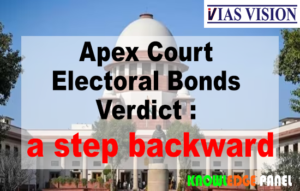ELECTORAL FUNDING FOR POLITICAL PARTIES
STATE ELECTION FUNDING Vs DONATION DEBATE & COMMITTEES
FUNDING OF ELECTION EXPENDITURE & ELECTION FUNDING CONTROVERSY:
ELECTION FUNDING TYPES CONTROVERSY:
FUNDING OF ELECTION EXPENDITURE;
Indian elections & also globally sees a large amount of money being used as electoral expenditure. This money needs to be clean, transparent & not adversely affecting electoral outcomes. The need for regulation arises because of the following reasons,
- Affects outcome - It affects outcome, which is highly undemocratic, because people may vote wrongly and may support corrupt parties, policies & candidates.
- Influence on policy making via criminal politician nexus - The financers may influence policy making later through financing favourable candidates.
- External interference - Foreign countries might interfere in elections by funding elections via many circuitous routes.
- Can increase black money - Lead to a large black money economy.
- High inflation might affect poor - Can lead to high inflation, because of black money.
- Level playing field might be lost - Small political parties & new entrants will find difficult to get elected.
Measures towards transparency in electoral funding
ELECTION FUNDING TYPES CONTROVERSY:
Various solutions to bring transparency in electoral funding,
To overcome the above problem, Indian government debated on a lot of possible solutions, as discussed below,
- State funding of elections – government pays election expenditure under a well set out plan, from the taxes they receive. This plan is criticized because it is from taxpayers money which could be better used elsewhere. Brazil and many US states use this model.
- Electoral bond scheme – donors pay political parties of their choice, from their tax paid money but question regarding influence on policy making remains.
Is donation by businessmen to political parties corruption?
In making elections free and fair from external influence, the donation to businesses is the central issue because of their share being a very high proportion of total donation.
Businessmen and businesses like anyone else is a citizen and has absolute right to influence elections to install a government of their choice.
INDIAN EFFORTS AND LEGISLATION TOWARDS TRANSPARENCY IN ELECTORAL FUNDING
ELECTION FUNDING TYPES CONTROVERSY:
Electoral Bond Scheme was started in 2018 & was amended in 2022, following were the salient features till it was declared unconstitutional in 2024.
- Electoral Bond is a type of instrument that functions like a cheque or a draft and an interest-free banking tool.
- Any Indian citizen can buy -Any Indian citizen or organization registered in India can buy these bonds after fulfilling the KYCnorms laid down by the RBI.
- It can be procured by a donor solely through the means of cheque or digital payments in various denominations, such as one thousand, ten thousand, one lakh, ten lakh, and one crore from specific branches of the State Bank of India(SBI).
- To be redeemed within 15 days of issuance - Within a span of 15 days of issuance, these electoral bonds can be redeemed in the designated account of a legally registered political party under the Representation of the People Act, 1951(u/s 29A) which got at least 1% of the votes in the last election.
- The stanches of bonds will be available for purchase for 10 days in the month of January, April, July, and October with an additional time-frame of 30 days in the year of General Elections for Lok Sabha.
- Electoral bonds features anonymity since it bears no identification of the donor and the political party to which it is issued.
Negatives of the scheme:
- Lack of transparency – donation bears no identification of the donor and the political party to which it is issued.
- Chance of proxy & shell companies being made to route black money into elections - scheme resulted in the elimination of the mandatory obligation for individuals or corporations to provide comprehensive information regarding their political contributions. Instead of reporting a comprehensive breakdown of political donations within their annual financial reports, companies would now be solely required to disclose a consolidated sum for purchase of electoral bonds.
VARIOUS COMMITTEES TOWARDS TRANSPARENCY IN ELECTORAL FUNDING
Few government reports have looked at state funding of elections in the past, including:
- Indrajit gupta committee on state funding of elections (1998)
- Law commission report on reform of the electoral laws (1999)
- National commission to review the working of the constitution (2001) - JMNR Venkatachaliah Commission
- Second administrative reforms commission (2008)
ELECTORAL BOND SCHEME DECLARED INVALID
ELECTORAL BOND SCHEME WAS CHALLENGED & DECLARED INVALID BY SUPREME COURT FOLLOWING THE VERDICT IN FEBRUARY, 2024
Supreme Court's Electoral Bonds Case Verdict

